CONTENTS
Guide
Australia
HarperCollins Publishers Australia Pty. Ltd.
Level 13, 201 Elizabeth Street
Sydney, NSW 2000, Australia
www.harpercollins.com.au
Canada
HarperCollins Canada
2 Bloor Street East - 20th Floor
Toronto, ON M4W 1A8, Canada
www.harpercollins.ca
New Zealand
HarperCollins Publishers New Zealand
Unit D1, 63 Apollo Drive
Rosedale 0632
Auckland, New Zealand
www.harpercollins.co.nz
United Kingdom
HarperCollins Publishers Ltd.
1 London Bridge Street
London SE1 9GF, UK
www.harpercollins.co.uk
United States
HarperCollins Publishers Inc.
195 Broadway
New York, NY 10007
www.harpercollins.com

This book was originally published under the title MMOIRES DUNE JEUNE FILLE RANGE. It is reprinted here by arrangement.
MEMOIRS OF A DUTIFUL DAUGHTER. Copyright 1958 by Gallimard, Paris. Translation 1959 by The World Publishing Company. Foreword 2005 by Hazel Rowley. All rights reserved under International and Pan-American Copyright Conventions. By payment of the required fees, you have been granted the nonexclusive, nontransferable right to access and read the text of this e-book on-screen. No part of this text may be reproduced, transmitted, downloaded, decompiled, reverse-engineered, or stored in or introduced into any information storage and retrieval system, in any form or by any means, whether electronic or mechanical, now known or hereafter invented, without the express written permission of HarperCollins e-books.
First Harper Perennial Modern Classics edition published 2005.
ISBN-10: 0-06-082519-7 (pbk.)
ISBN-13: 978-0-06-082519-5 (pbk.)
EPub Edition March 2016 ISBN 9780062566171
15 16  /RRD 10 9 8 7
/RRD 10 9 8 7
S imone de Beauvoir was a prolific writer, in a remarkable range of genres. She will always be associated with that twentieth-century landmark The Second Sex, and for her novel The Mandarins, depicting the political squabbles and love affairs of a group of French intellectuals in the postwar world. But without any doubt Simone de Beauvoir is most warmly remembered for her memoirs. In them she tells her best and most stirring story, the story of her own life.
Few writers have recorded their own experiences so compulsively. This first volume, Memoirs of a Dutiful Daughter (1958), would be followed by three more: The Prime of Life (1960), Force of Circumstance (1963), and All Said and Done (1972). But Beauvoirs autobiographical writings did not end there. Two of her novels, She Came to Stay and The Mandarins, were closely based on dramatic episodes in her own life. In America Day by Day she wrote about her four-month sojourn in the United States. A Very Easy Death is a tender memoir about the death of her mother; Adieux: A Farewell to Sartre is a wrenching account of her companions last years.
We all know the photographs of Beauvoir and Sartre writing in Left Bank cafsplaces that are now full of tourists who, while they sip their drinks, invariably make mention of the famous pair. Beauvoir, just like Sartre, was happiest writing with the hubbub of the world around herin cafs, train stations, wherever she could get out her notebook and fountain pen, and fill pages with the scrawling, scarcely decipherable handwriting her friends all complained about. Since her death, in 1986, her war journal and several volumes of love letters (to Sartre, Nelson Algren, and Jacques-Laurent Bost) have seen the light of day. With each new publication, readers find themselves freshly astounded. There seems to have been no limits to this womans energy, her passion for life, her sparkling intelligence, her sheer vitality. How did she fit so much into one lifetime?
Jean-Paul Sartre was a guiding force and moral support for Beauvoir, just as she was for him. He encouraged her, in the true sense of the word; he brought out her courage. During their long years of literary apprenticeshipyears in which they both produced draft after draft that would end up, like their other manuscripts, relegated to a drawerSartre saw that Beauvoir was at her best when she portrayed her own experience. Look, he told her one day, as they sat in a noisy, smoke-filled Paris caf discussing their work, why dont you put yourself into your writing? Beauvoir writes that she felt the blood rush to her cheeks. Id never dare to do that, she said. Screw up your courage, Sartre said.
That conversation resulted in She Came to Stay (1943). Inspired by the amorous trio Beauvoir and Sartre had formed with a young woman, the novel skated so close to real life that it shocked even their friendsnot to speak of the French Catholic bourgeoisie. Beauvoirs very first book caused a frenzy of gossip, and seeded the Sartre-Beauvoir legend. From the beginning, and this would never change, the name Simone de Beauvoir carried a strong whiff of scandal.
No sooner had the war. ended than Sartre and Beauvoir found themselves in the glare of fame. It happened almost overnight. Existentialism became a craze, the new intellectual fashion. Sartres philosophy struck a chord, particularly with young people who, having experienced the Holocaust and the atomic bomb, no longer believed in the old myth of eternal progress and were tired of feeling powerless. Existentialism acknowledged the absurdity of the human condition, while at the same time insisting on individual freedom and choice.
Sartre and Beauvoir often discussed the extent to which their friends were free, or not free, to choose their lives. What interested them was to understand a persons situationones social class, family dynamics, physical constitution, self-image, and so onwhile scrutinizing, as if under a microscope, any signs of rebellion or moments of compliance. They saw these as defining moments, which reflected fundamental choices. Since, according to these two existentialists, choices were demonstrated by actions (it is not interesting to want to write a book: you have to actually write one), peoples actions cast light on their original project.
It was 1946 when Beauvoir first thought of writing her childhood memoirs. She was keen to consider her own childhood and adolescence through an existential framework. What had made her decide to be a writer? Which were the turning points in her life, when she had chosen the person she had become? Sartre made the comment that she would need to think carefully about what it had meant to be a woman, how it had affected her upbringing, her aspirations and choices. Beauvoir saidprobably with a touch of impatiencethat she didnt think it had affected her much at all. She had never felt inferior because she was a woman, and her education placed her among the privileged few. She and Sartre had not married, they did not have children, they did not live under the same roof, they each had other lovers: she felt freer than most of the men she knew. All the same. Sartre insisted, you werent brought up in the same way as a boy would have been; you should look into it further.
Convinced she could dispense with the subject quickly, Beauvoir went to the Bibliothque Nationale and looked up everything she could find about women and the myths of femininity. After some weeks, she felt as if her head had been turned inside out. It was a revelation, she would write. This world was a masculine world, my childhood had been nourished by myths forged by men, and I hadnt reacted to them in at all the same way I should have done if I had been a boy.

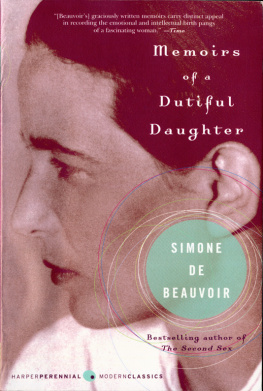
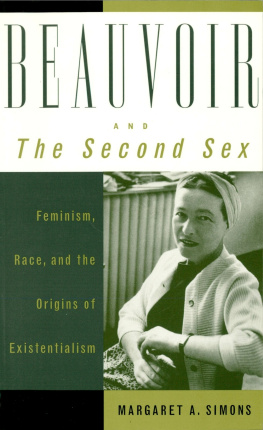

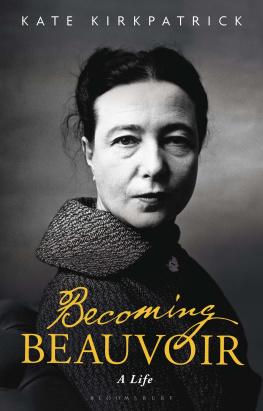




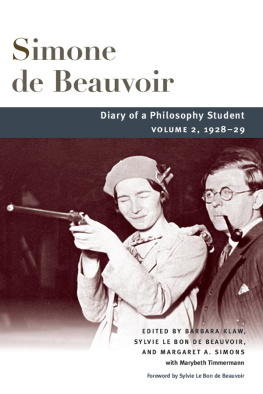
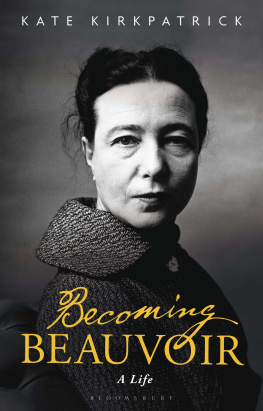
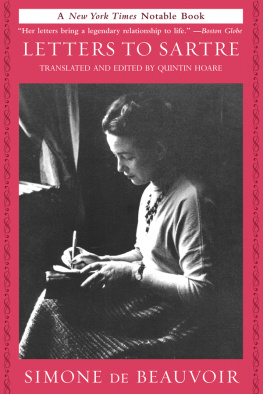
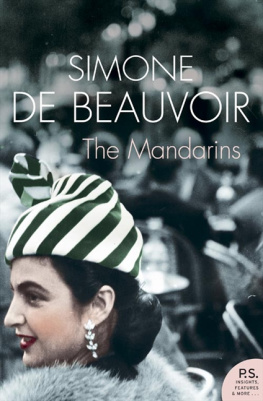
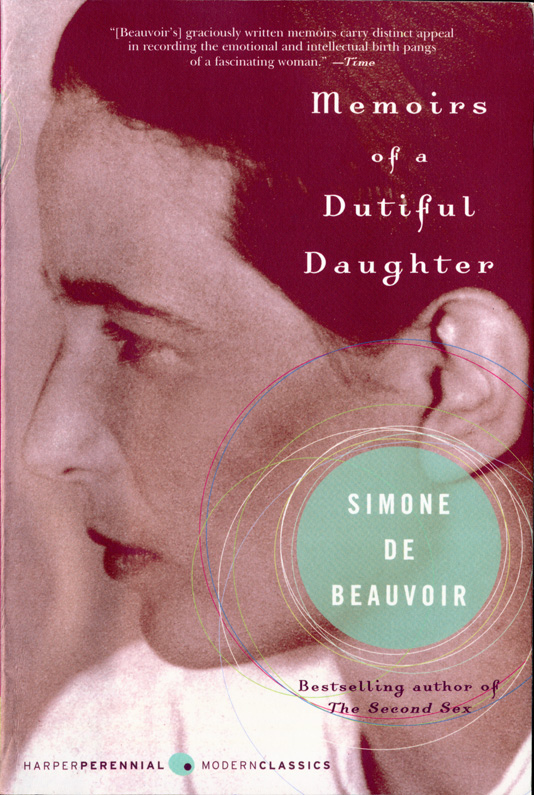

 /RRD 10 9 8 7
/RRD 10 9 8 7